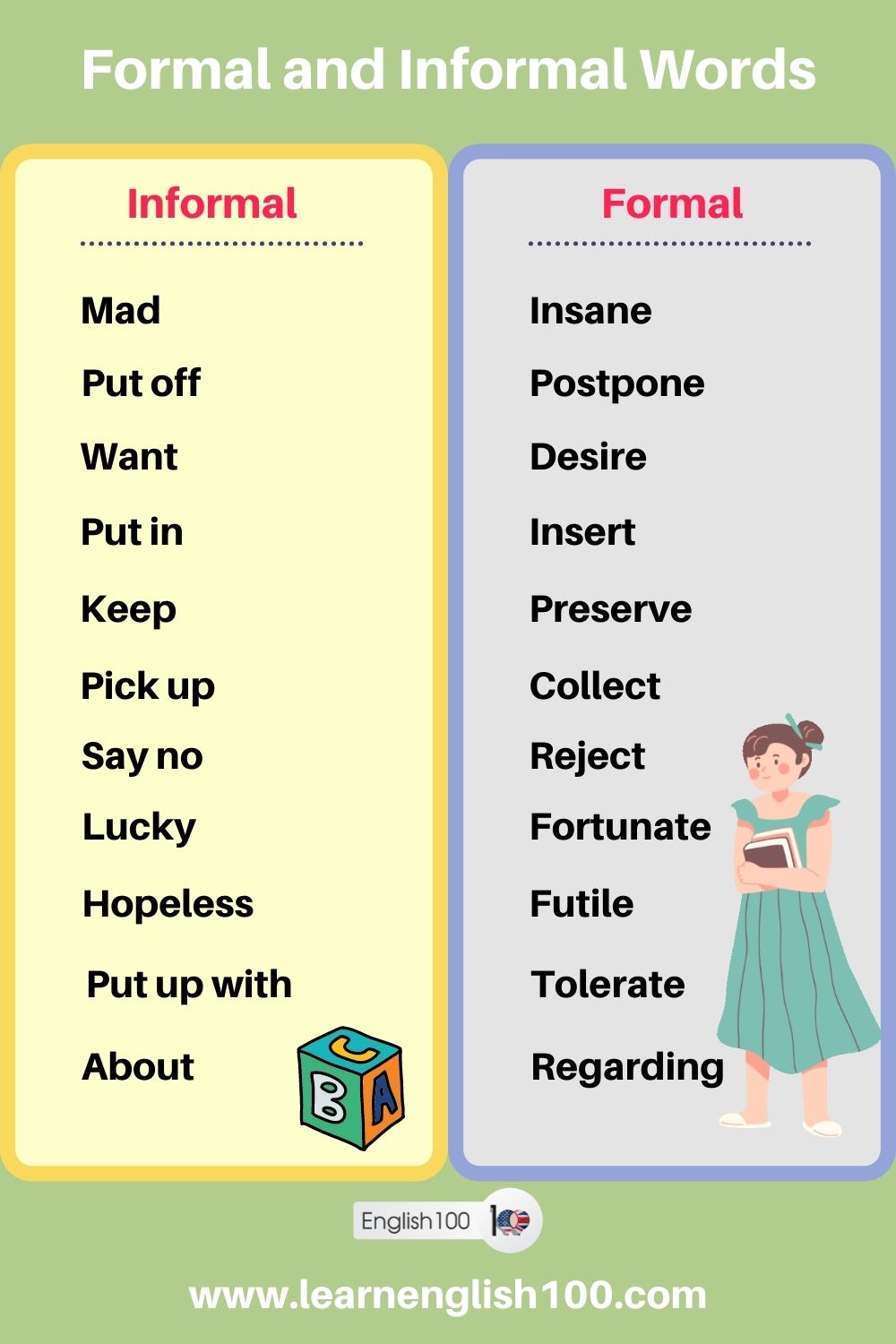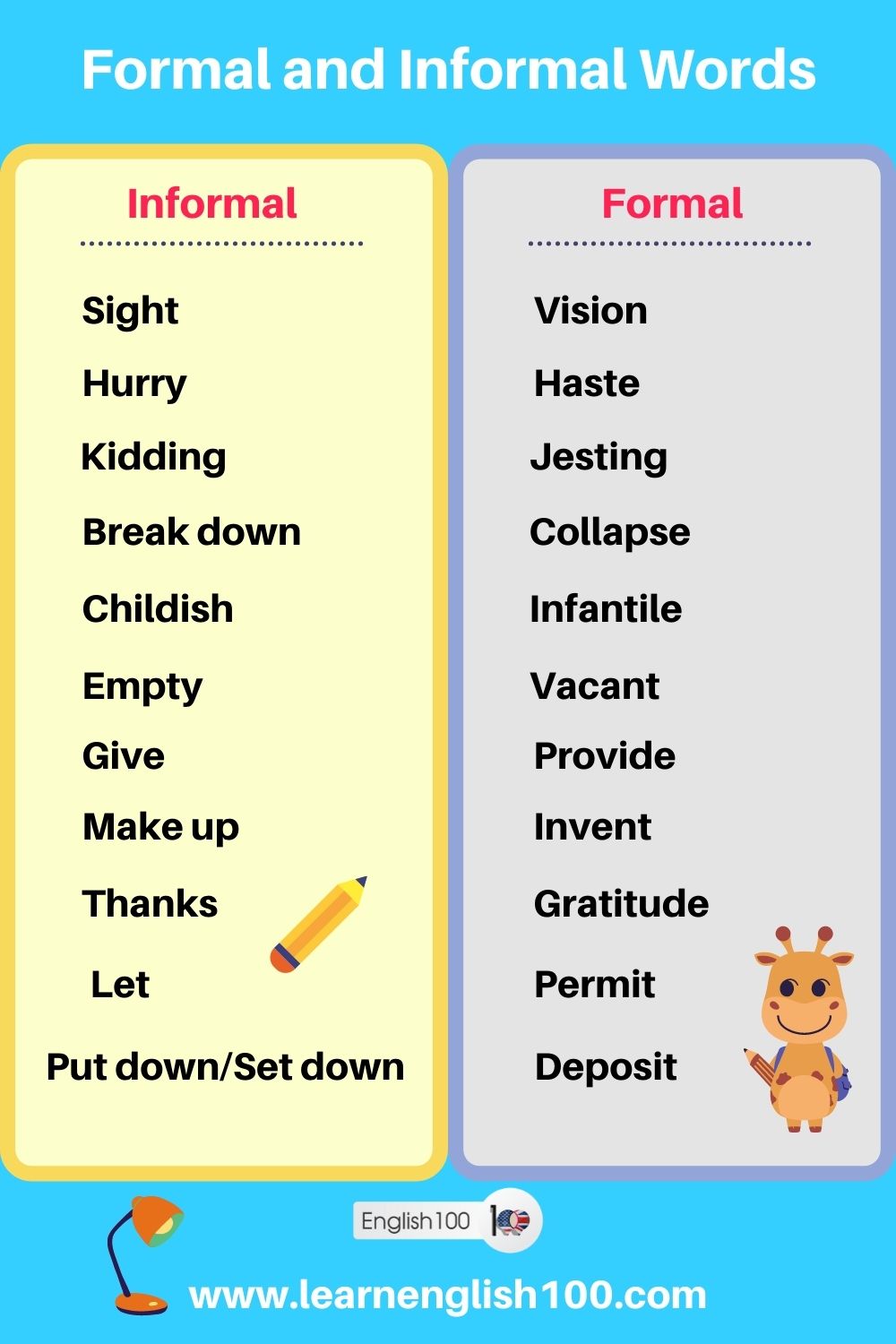
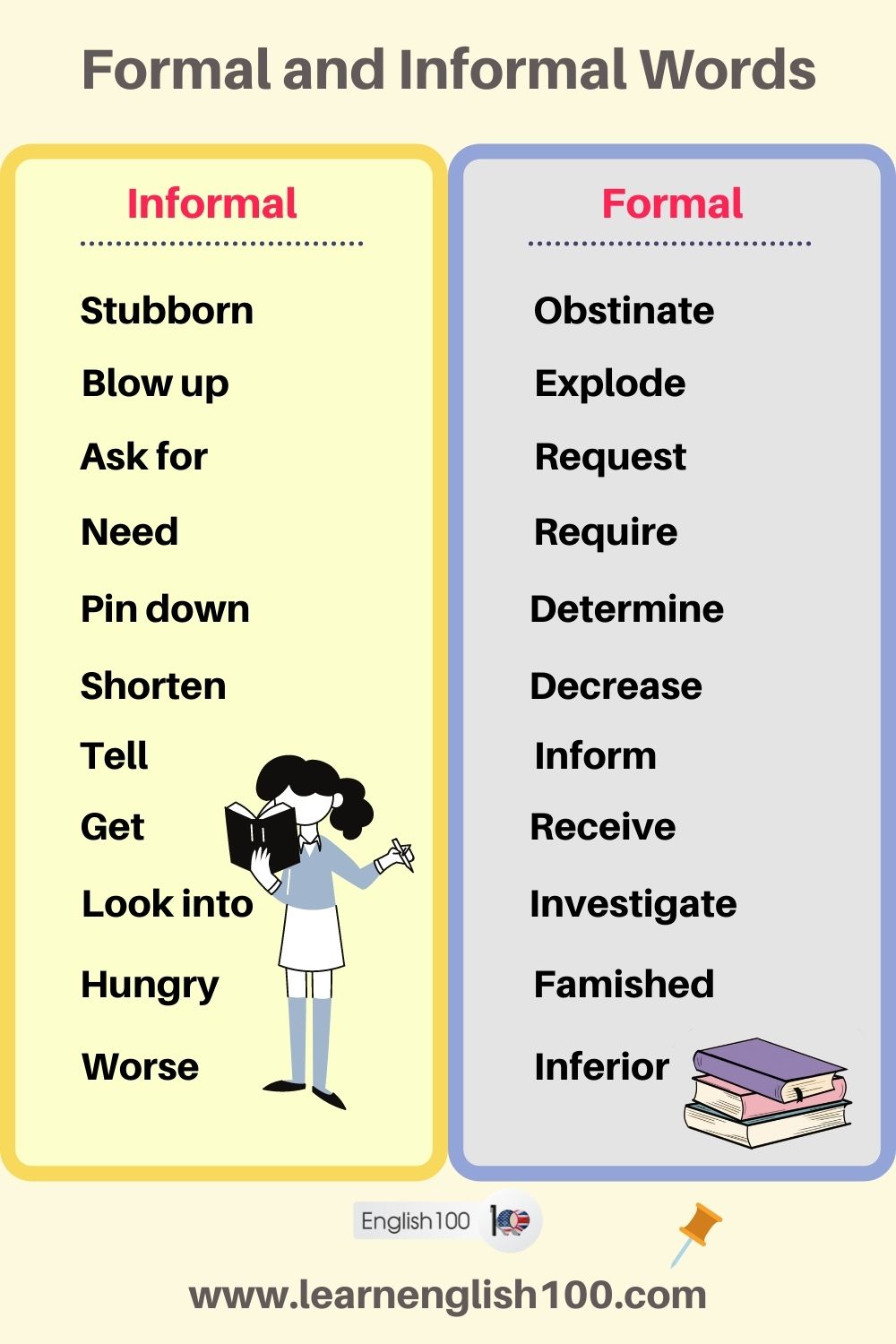
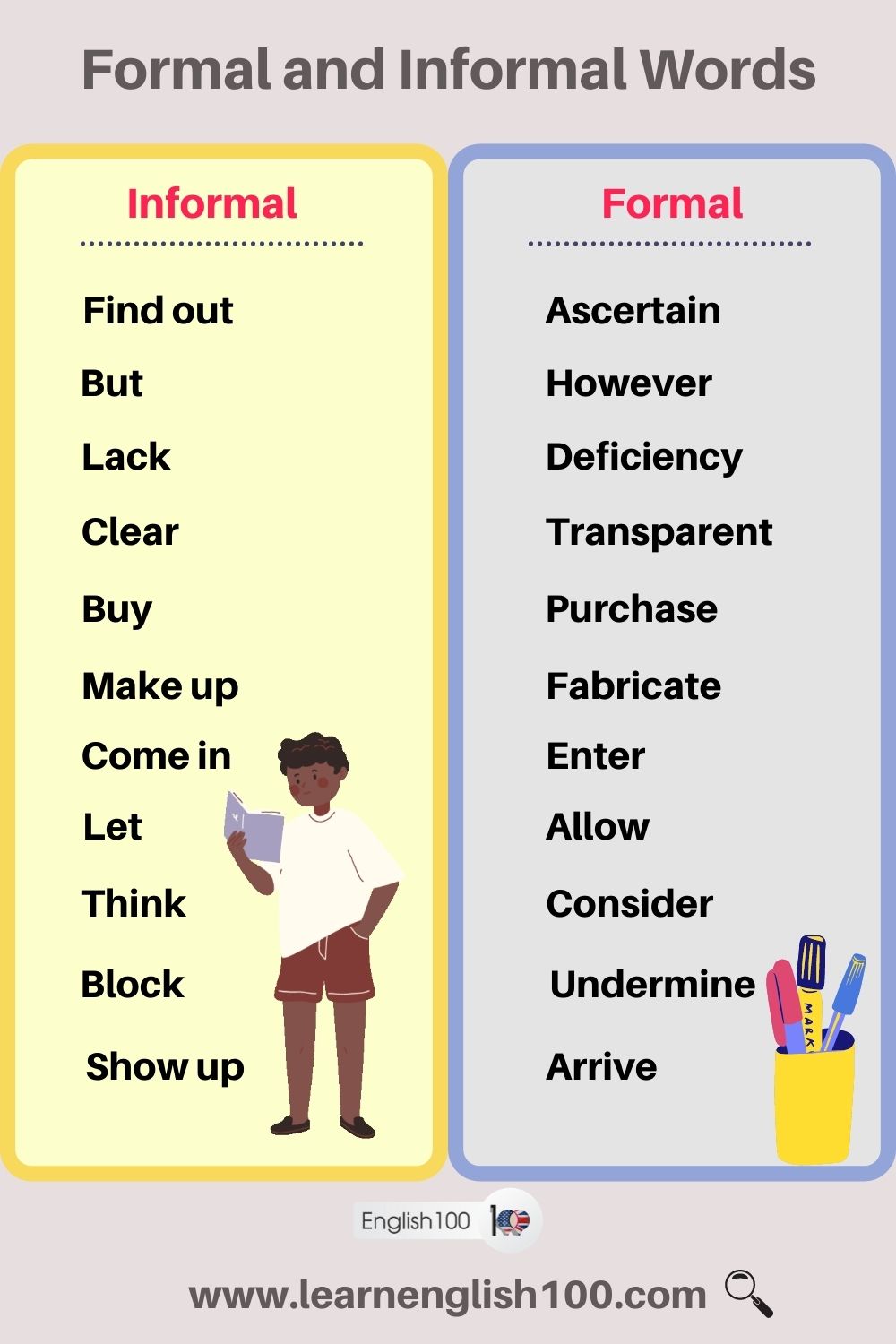
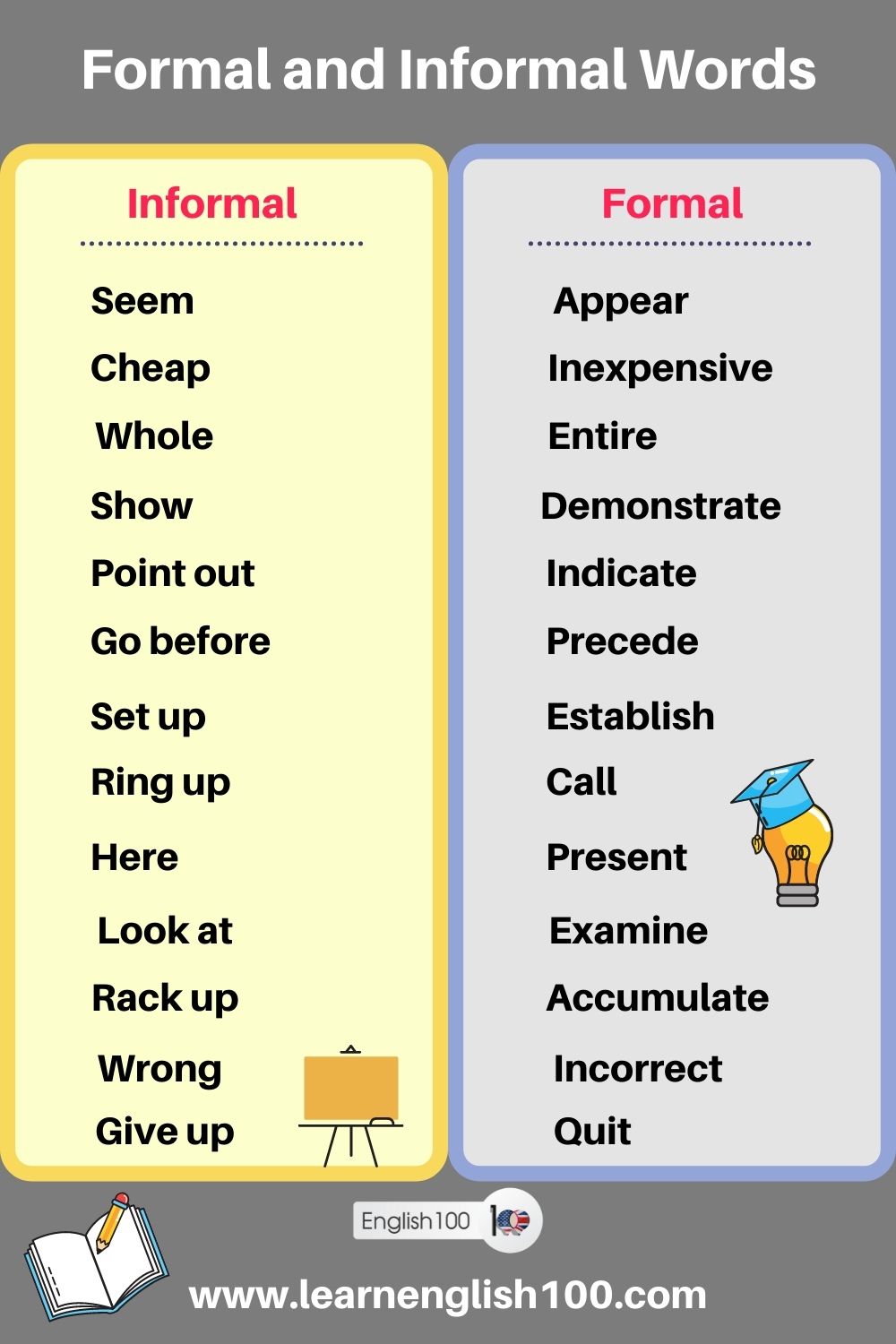
Formal and Informal Words
There are many types of vocabulary, and there is a lot of confusion over the differences between them.
Here is a detailed list of words that are informal and their formal equivalent:
Informal / Formal
Mad = Insane
Put off = Postpone
Want = Desire
Put in = Insert
Keep = Preserve
Pick up = Collect
Say no = Reject
Lucky = Fortunate
Hopeless = Futile
Put up with = Tolerate
About = Regarding
Sight = Vision
Hurry = Haste
Kidding = Jesting
Break down = Collapse
Childish = Infantile
Empty = Vacant
Give = Provide
Make up = Invent
Thanks = Gratitude
Let = Permit
Put down/Set down = Deposit
Stubborn = Obstinate
Blow up = Explode
Ask for = Request
Need = Require
Pin down = Determine
Shorten = Decrease
Tell = Inform
Get = Receive
Look into = Investigate
Hungry = Famished
Worse = Inferior
Find out = Ascertain
But = However
Lack = Deficiency
Clear = Transparent
Buy = Purchase
Make up = Fabricate
Come in = Enter
Let = Allow
Think = Consider
Block = Undermine
Show up = Arrive
Seem = Appear
Cheap = Inexpensive
Whole = Entire
Show = Demonstrate, Illustrate, Portray
Point out = Indicate
Go before = Precede
Set up = Establish
Ring up = Call
Here = Present
Look at = Examine
Rack up = Accumulate
Wrong = Incorrect
Give up = Quit
Formal and informal vocabularies can be difficult to understand, but we will try to make things easier with this guide.
Formal and informal vocabularies play a big role in the English language. However, it is often difficult to know which words are formal or informal and how they should be used.
Formal Vocabulary: It is used in Formal settings like interactions with your colleagues, your boss, strangers, people who occupy higher positions or titles, like state officials.
Informal Vocabulary: It is used in any situation which possesses any personal associations. Meaning, any position in which there is personal involvement and relationship between all parties allows for the use of informal vocabs. For example, with state officials whom you know personally, the informal discourse is natural, and of course, family, friends, and youngsters.
In this blog, we have discussed the various situations where you use different types of vocabulary. In English, there are many more words that have been derived from Latin and Greek. However, many of these words have been Anglicized and adapted to British English. In some cases, a word will retain its original meaning but be used in a slightly different way or in a new context. For example, the word “council” is derived from the Latin word “consilium”, which means advice or council. The word has two main uses: to refer to a group of people with specific responsibilities (for example, the Council of Ministers) or to refer to a meeting where decisions are made.
Formal language is less personal than informal language. It is used when writing for professional or academic purposes like graduate school assignments. Formal language does not use colloquialisms, contractions or first-person pronouns such as “I” or “We.” Informal language is more casual and spontaneous. 1
FAQ
What is an example of formal and informal sentences?
Formal:
“May I inquire about the availability of the conference room for our meeting on Friday?”
“I regret to inform you that your application for the position has not been successful.”
“Would you kindly provide me with your opinion on the current market trends?”
Informal:
“Can I ask if the meeting room is free on Friday for our get-together?”
“Sorry, but your job application didn’t make the cut.”
“Hey, what do you think about the latest trends in the market?”
In formal sentences, you’ll typically find more polite language, longer sentences, and a respectful tone. Informal sentences, on the other hand, tend to be shorter, more relaxed, and use colloquial language. The choice between formal and informal language depends on the context and the level of politeness or familiarity required.
What types of words are formal?
Formal words, also known as formal vocabulary, are typically characterized by their use in professional, academic, and official settings. They convey a sense of seriousness, respect, and professionalism. Formal words are often chosen for written documents, speeches, presentations, or when addressing individuals in authority. Here are some common types of words that are considered formal:
Longer Words: Formal language often uses longer and more complex words, such as “utilize” instead of “use” or “terminate” instead of “end.”
Latinate Words: Many formal words are derived from Latin or have Latin roots, giving them a more formal and sophisticated tone. For example, “terminate” (Latin: terminare) or “examine” (Latin: examinare).
Technical or Specialized Vocabulary: In technical fields or academic contexts, formal language may include specialized terms and jargon unique to that field.
Polite Phrases: Formal language often includes polite phrases, such as “please,” “thank you,” and “sir” or “madam.”
Third-Person Pronouns: The use of third-person pronouns like “he,” “she,” or “they” is more common in formal language, as opposed to informal “you” or “I.”
Avoidance of Contractions: Formal writing tends to avoid contractions like “don’t,” “can’t,” or “won’t,” using the full forms “do not,” “cannot,” and “will not” instead.
Avoidance of Slang and Informal Expressions: Formal language avoids slang, colloquialisms, and informal expressions.
Passive Voice: Formal writing often uses the passive voice, where the focus is on the action rather than the person performing the action. For example, “The report was written by John” instead of “John wrote the report.”
Complete Sentences: Formal language favors complete, grammatically correct sentences over sentence fragments or incomplete thoughts.
Impersonal Language: It sometimes employs an impersonal or objective tone, such as “It is believed that…” or “One should consider…”
Archaic or Elevated Language: In very formal or traditional contexts, archaic or elevated language may be used, such as “thou” instead of “you” or “whence” instead of “where.”
What is the difference between formal and slang words?
Formal and slang words are two extremes of the language spectrum, and they differ significantly in their usage, tone, and appropriateness in various contexts. Here are the key differences between formal and slang words:
Usage and Context:
Formal Words: These words are used in formal, professional, academic, or official contexts. They are employed when politeness, professionalism, and respect are required.
Slang Words: Slang words are informal and are typically used in casual, conversational settings among friends, peers, or in relaxed social situations.
Tone:
- Formal Words: Formal language conveys a serious, respectful, and dignified tone. It is used to maintain decorum and professionalism.
- Slang Words: Slang language often has a playful, informal, or even irreverent tone. It can be humorous, expressive, and may not adhere to traditional language rules.
Appropriateness:
- Formal Words: These words are considered appropriate and expected in formal situations, such as job interviews, academic papers, legal documents, and official correspondence.
- Slang Words: Slang is generally considered inappropriate in formal contexts and may be seen as unprofessional or disrespectful.
Acceptance and Standardization:
- Formal Words: Formal words adhere to standard language rules and are widely accepted as part of the language. They are often found in dictionaries and grammar guides.
- Slang Words: Slang is non-standard language and may not be universally understood or accepted. It can vary greatly between regions and subcultures.
Examples:
- Formal Words: “Utilize” instead of “use,” “terminate” instead of “end,” “apprehend” instead of “catch.”
- Slang Words: “Cool” instead of “good,” “gonna” instead of “going to,” “chill” instead of “relax.”
Variability:
- Formal Words: Formal language tends to be stable and consistent, with limited changes over time.
- Slang Words: Slang is highly dynamic and can change rapidly. New slang terms emerge, and old ones may fall out of use.
Audience:
- Formal Words: These are suitable when communicating with authority figures, in academic or professional settings, and when addressing people you don’t know well.
- Slang Words: Slang is typically used among friends, peers, or in casual social interactions where informality is accepted.
What is the difference between formal and informal expressions?
Formal and informal expressions differ in their style, tone, and appropriateness for various contexts. Here are the key differences between the two:
Style and Language:
Formal Expressions: These expressions use more complex and sophisticated language. They often employ complete sentences and avoid contractions (e.g., “I do not” instead of “I don’t”).
Informal Expressions: Informal language tends to be simpler, using shorter sentences and contractions freely (e.g., “I can’t” instead of “I cannot”).
Tone:
Formal Expressions: Formal language conveys a serious, respectful, and dignified tone. It is used in professional, academic, and official contexts.
Informal Expressions: Informal language is more relaxed and conversational. It can range from casual to friendly or even colloquial.
Vocabulary:
Formal Expressions: These expressions often use precise, specific, and less common vocabulary. They may avoid slang or colloquial terms.
Informal Expressions: Informal language includes everyday vocabulary, colloquialisms, and slang. It may use words and phrases specific to a particular group or region.
Politeness:
Formal Expressions: Formal language is inherently polite and respectful. It often includes polite phrases and titles, such as “please,” “thank you,” and “Mr.” or “Mrs.”
Informal Expressions: Informal language may omit polite phrases and titles, relying more on a friendly and casual tone.
Appropriateness:
Formal Expressions: These expressions are suitable for professional communication, academic writing, official documents, and when addressing authority figures.
Informal Expressions: Informal language is used among friends, family, peers, and in relaxed social settings. It may be considered inappropriate in formal contexts.
Examples:
Formal Expressions: “I regret to inform you that your application was not successful.” “Would you kindly provide your feedback?”
Informal Expressions: “I’m sorry, but you didn’t get the job.” “Can you tell me what you think?”
Structure:
Formal Expressions: Formal language often follows traditional grammatical rules and uses complete sentences.
Informal Expressions: Informal language may include sentence fragments, incomplete thoughts, and conversational shortcuts.
Audience:
Formal Expressions: These are used when addressing individuals or groups in professional, academic, or official settings.
Informal Expressions: Informal language is employed when communicating with friends, family, peers, or in casual social interactions.
Consistency:
Formal Expressions: Formal language tends to be consistent and stable, with limited changes over time.
Informal Expressions: Informal language can be highly dynamic and may change rapidly as new slang and colloquialisms emerge.
In conclusion, the distinction between formal and informal words plays a crucial role in effective communication. Throughout this article, we’ve explored the key differences between these two types of language expressions.
Formal words are reserved for professional, academic, and official contexts, where a serious and respectful tone is required. They utilize complex language, maintain a polite demeanor, and adhere to established language rules. Informal words, on the other hand, thrive in casual, conversational settings, fostering a relaxed and friendly atmosphere. They simplify language, embrace contractions, and may incorporate slang and colloquial terms.
References:

